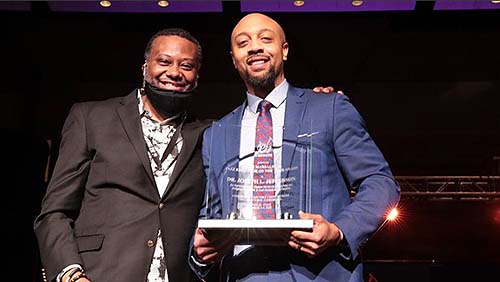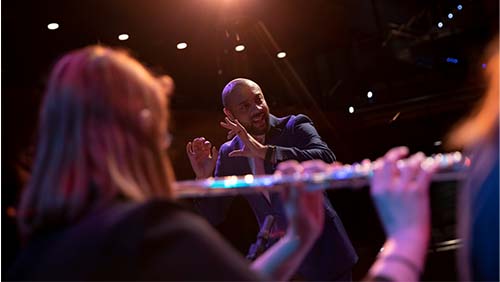Dr. Joseph L. Jefferson, director of jazz studies and assistant professor of trombone/euphonium at Southeast Missouri State University, has been named the Jazz Education Network's 2022 Ellis Marsalis, Jr. Jazz Educator of the Year.

Named after the legendary jazz educator Ellis Marsalis, Jr., this award recognizes an outstanding collegiate educator with a focus on jazz education, who represents the highest standards of teaching and whose results in the classroom have brought distinction to their institution and their students.
Being recognized on this national and international platform by the Jazz Education Network is truly an honor, said Jefferson.
“It is an indicator that the long days/nights of teaching, learning scores, listening to rehearsals, recruiting, and providing resources beyond the classroom has had some sort of impact,” he said. “For that, I am thankful and glad to be a servant. In addition, it should also highlight and provide more visibility to the University and Department of Music across the country. Collectively, our music faculty work very hard to provide meaningful experiences for our students.”
The award was presented Jan. 6 at the Annual Jazz Education Network Conference in Dallas, Texas.
“In his honor, you have been selected as a collegiate jazz educator who represents the highest standards of teaching, impacting hundreds of lives through this great art form and your leadership,” said JEN President Sean Jones. “It is obvious that you are an ideal recipient of this prestigious award.”

Jefferson began his career at Southeast Missouri State University in 2017. In addition to directing Southeast’s two jazz bands — Studio Jazz Ensemble and Jazz Lab Band – he also organizes the annual Clark Terry/Phi Mu Alpha Jazz Festival, which features more than 500 students in jazz ensembles from across the bi-state region and showcases jazz experts and guest artists.
As a lifelong learner and educator, he has always strived to pour into students the same way his teachers did for him, Jefferson said, and teaching this music goes well beyond playing the “correct” scale/chord relationships.
“My students often hear me say, ‘What you are playing is correct, but does it connect?’ Having a strong understanding of the music harmonically is essential. However, students must have knowledge of the origin of jazz and recognize the importance of the defining element of the genre, improvisation; incorporating African rhythms, work songs, field hollers and blues sang by slaves and later originated by African American communities of New Orleans.”
His personal teaching philosophy strives to invoke student’s understanding in jazz, and its language, by reinforcing the historical, theoretical, and the stylistic context of the genre.
“Technical excellence and the highest musical standards are indeed integral to a jazz ensemble/program; however, fostering student growth is paramount,” he said. “Performance, then, does not become the culmination of the process but a stepping-stone along the path of which there is always room for discovery to learn, grow, and improve.
It is my hope that students who have participated in the jazz ensembles/ classes under my direction leave with a self of musical fulfilment, understanding and great care for the American tradition. In turn, as future music educators, they will share their experiences with their students and incorporate meaningful performance and learning opportunities for their students to enjoy jazz for many years to come.”